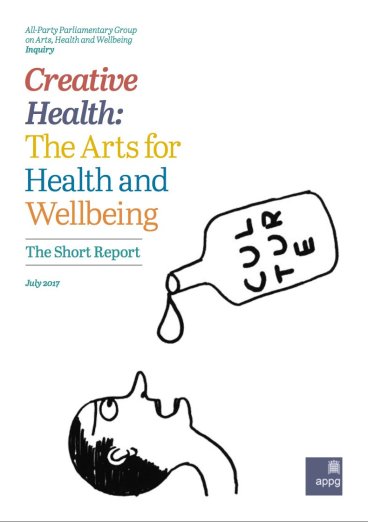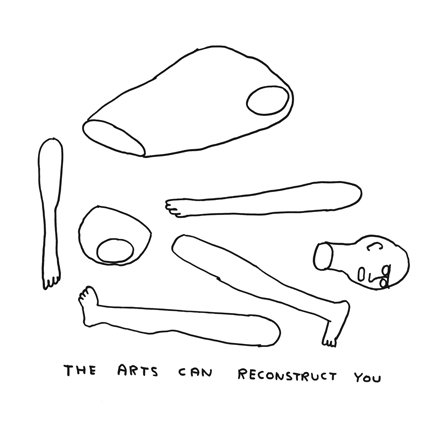The Creative Health report launched this week from Westminster, forming a comprehensive platform for the field of arts and health. The launch was followed by the Northern launch in Manchester on Friday.
The report is the result of a two-year inquiry by the All-Party Parliamentary Group on Arts, Health and Wellbeing, a process which included 16 round tables and contributions from over 300 people.
The three key messages of the report are:
– The arts can help keep us well, aid recovery, and support longer lives better lived
– The arts can help meet major challenges facing health and social care
– The arts can save money in the health service and social care
A Short Report is available here – but I fully recommend the entire document! It is wonderfully well-structured and accessible. A very brief outline of the report is provided below.

The Launch: Highlights
The Rt Hon Lord Howarth of Newport graced the event with his eloquence and commitment, just weeks after his Keynote at the Bristol Culture, Health and Wellbeing International Conference. A report of this scale and potential, said Lord Howarth, “is a gift horse that is bound to be noticed.”
Alan Higgins, Director of Public Health Greater Manchester, suggested the report will allow dialogue at a senior level within the NHS. Among those present was Langley Brown, who pioneered the arts and health field with Peter Senior in Greater Manchester in the 1970s and whose collection is now archived at the Wellcome Trust. Manchester is widely regarded as the historical spring of arts for health, and is a current hotbed of activity in the UK following Devolution. Fittingly, it was Arts for Health at MMU hosting the event in the week of its 30th anniversary.
Jackie Wood, Artistic Director of the well-established Arc Centre in Stockport, spoke of the arts not as the icing on the cake, but a fundamental ingredient of being human. The Creative Health Report reminds us of this and calls for a recognition of the potential for the arts to significantly improve wellbeing across the lifespan.
Start in Salford has operated for over 20 years and works with 800 – 1000 people every year, delivering safe, supportive, confidence-boosting and skill-building workshops that help people rebuild their lives following mental ill health. Bernadette Conlon, chief executive and founder of Start, shared a short film alongside Paul Jordan, Artist in Residence. The video is beautifully authentic and magnificently demonstrates the real and transformational power of the arts.
A spirited and defiant exploration of recovery from addiction followed, from director of Portraits of Recovery Mark Prest, MMU’s Amanda Ravetz and Michaela Jones, Recovery Activist. Further to Michaela’s powerful testament of recovery from addiction and social anxiety was the huge photograph of her naked painted self, when in the past she could not even look at herself in the mirror.
These stories showed the depth of the shifts that the arts can make in people’s lives. “It put me back on the ladder to life,” said Danny Collins of the Homeless Librarians who was helped off the streets by the people and the project.

Creative Health: A Very Brief Summary
The report begins by outlining the contribution of social determinants on health outcomes. Chapter 3 discusses the types of evidence used in the diverse field of arts and health, and Chapter 4 offers a discussion on the policy, commissioning and funding landscape.
The report then focuses on the application of the arts, firstly to place, environment and community, before several chapters dedicated to taking us on a journey through the lifespan. Within these sections we are treated to a wide array of evidence and examples of arts and heath practices that really bring the subject to life.
The report concludes with 10 recommendations, which, importantly, are clear, achievable and provided with implementation in mind. There are no calls for new legislation, extra expenditure or changed structures, but for a culture shift that encourages people to “express their aspirations rather than rehearse their deprivations” (from the Opus report: The Many Faces of Wellbeing).
The main message of this report is that the arts are a fundamental part of being human and are good for you – and a wealth of evidence supports this claim. The arts and creativity should be used alongside conventional medicine to boost wellbeing at the individual and societal level. I have high hopes that by the time I might need a care home, live music will be a clinical care pathway.
Next time: The Early Career Researcher Network
Last week I was thrilled to be appointed the North West Representative of the Arts and Health Early Career Researchers Network led by Dr Daisy Fancourt. Daisy is one of ten BBC New Generation Thinkers, and a World Economic Forum Global Shaper. Her work has made important contributions to the field of arts and health. The Network has produced a five-minute Podcast summarising the Creative Health report: listen here.
I’m currently organising the first ECRN North West event for Monday 14th August at 8pm – details to follow. Join today!

Congrats on the new role. Sounds like very interesting and rewarding work.
LikeLike
Thank you Andy! The event will follow the preview of an exhibition from the Dementia and Imagination study, which the Dukes have agreed to host from Aug 14th, you should come! Preview at 6pm on 14th and it’ll be there for 3 weeks
LikeLike